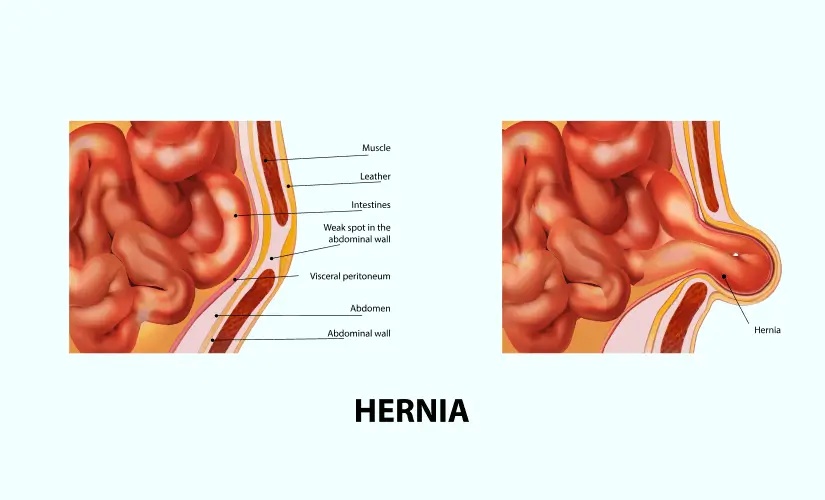-
Doctors
-
Specialities & Treatments
Centre of Excellence
Specialties
Treatments and Procedures
Hospitals & Directions HyderabadCARE Hospitals, Banjara Hills CARE Outpatient Centre, Banjara Hills CARE Hospitals, HITEC City CARE Hospitals, Nampally Gurunanak CARE Hospitals, Musheerabad CARE Hospitals Outpatient Centre, HITEC City CARE Hospitals, Malakpet
HyderabadCARE Hospitals, Banjara Hills CARE Outpatient Centre, Banjara Hills CARE Hospitals, HITEC City CARE Hospitals, Nampally Gurunanak CARE Hospitals, Musheerabad CARE Hospitals Outpatient Centre, HITEC City CARE Hospitals, Malakpet Raipur
Raipur
 Bhubaneswar
Bhubaneswar Visakhapatnam
Visakhapatnam
 Nagpur
Nagpur
 Indore
Indore
 Chh. Sambhajinagar
Chh. SambhajinagarClinics & Medical Centers
Book an AppointmentContact Us
Online Lab Reports
Book an Appointment
Consult Super-Specialist Doctors at CARE Hospitals

Hernia
Symptom, Causes, Diagnosis and Treatment
Hernia
Hernia is a common medical condition worldwide, affecting millions yearly. Think of a hernia as a bulge where some organs or tissues inside your body poke through a weak spot in the muscle or tissue around it. Hernia ranges from mild to severe, and sometimes surgery is needed to fix them. Let's dive into the different types of herniation, what causes them, how to spot them, how doctors diagnose them, treatment options, home remedies, and ways to prevent them.

What is Hernia?
A hernia happens when a tissue or organ pushes out through a weak spot in the muscle, which usually keeps it in place. While hernia can occur anywhere in the body, they're most common in the belly, groin, and upper thigh areas. Some people are born with hernia (congenital), while others develop them over time (acquired) due to various situations like straining muscles, carrying extra weight, or having surgery in the past.
Common Types of Hernia
Hernia comes in several types based on where they occur or what causes them. Here are the main ones you should know about:
- Inguinal Hernia: This is the most common type. It happens when part of your intestine or belly fat pushes through a weak spot in your lower belly wall near your groin.
- Femoral Hernia: This type develops when intestines or belly tissue squeeze through the femoral canal, a small passage near the groin.
- Umbilical Hernia: This type of hernia develops when part of your intestine or belly tissue bulges out near your belly button.
- Hiatal Hernia: In this case, a portion of your stomach pushes up through the diaphragm, the muscle that acts as a wall between your chest and the belly.
- Incisional Hernia: This type develops when you've had belly surgery before. Your intestine or belly tissue plunges through the weakened area from the old cut.
- Congenital Hernia: Some people are born with hernia, which can appear in different places, such as the groin, belly, or diaphragm.
Symptoms
Hernia symptoms in men and women can vary and depend on the type and how bad it is. Here are some common signs and symptoms to watch for:
- You can see a bulge or lump in the affected area (like your groin, upper thigh, or belly button)
- Pain or discomfort in that spot, especially when you cough, lift heavy things, or strain during bowel movements
- The area feels heavy, or like there's constant pressure
- Swelling or enlargement of the affected area
- Nausea and vomiting (this can happen with a strangulated hernia)
- Constipation or trouble passing gas
What Causes Hernia?
Several things can weaken your muscles or put a strain on the tissues in the affected area, thus becoming a cause of hernia:
- Extra Pressure in Your Belly: Certain conditions can strain the abdominal muscles, leading to hernia. These include being overweight, pregnant, coughing a lot, being constipated, or straining when you go to the bathroom.
- Heavy Lifting: Frequently lifting heavy objects without proper technique can increase abdominal pressure.
- Weak Muscles: As we age, our muscles can get weaker. Injuries or surgeries can also make the muscles in the belly or groin more likely to develop hernia.
- Congenital Factor: Some people naturally have weaker muscles or tissues, making them more prone to getting hernia early in life.
- Long-Term Health Issues: Chronic conditions like COPD, cystic fibrosis, or constant coughing can increase pressure in your belly, raising your chances of getting a hernia.
- Injuries or Accidents: Injury to the abdomen or groin area can weaken muscles or tissues, potentially leading to hernia.
How Doctors Diagnose Hernia
To figure out if you have a hernia, your doctor will:
- Medical History: Doctors may inquire about your symptoms, trigger factors, and duration of the condition. They can also ask if you had hernia surgery before.
- Look at the Area: They'll gently touch the area to check for unusual lumps or bulges.
- Use Imaging Tests: Sometimes, doctors may conduct an ultrasound, CT scan, or MRI to confirm the hernia and determine its size and where it's located.
Treating Hernia
Treatment of hernia depends on several things, like what type it is, how severe it is, your age, your overall health, and what you prefer. Here are some common ways to treat hernia:
- Watch and Wait: For small hernia without symptoms, your doctor might suggest keeping a watch on it and making lifestyle changes. These could mean losing weight or avoiding activities that strain the area.
- Hernia Supports: These are hernia treatment without surgery. Your doctor might suggest using a support belt for small or reducible hernia. The belt helps keep the bulging tissue in place and eases discomfort.
- Open Surgery: In this procedure, doctors create an incision near the hernia. They push the bulging tissue back where it belongs and strengthen the weak spot with mesh or stitches to prevent future problems.
- Laparoscopic Surgery: This less invasive method uses small cuts in your belly. The surgeon uses special surgical tools and a camera to fix the hernia. You often recover faster than with open surgery.
Risk Factors
Several things can make you more likely to get a hernia:
- Getting Older: Your risk goes up after 50 as muscles and tissues weaken.
- Being Male: Hernia in men is more common, especially in the groin.
- Family History: If an immediate relative had a hernia, you might be more prone to it.
- Extra Weight: Being overweight puts more pressure on your belly, increasing your risk.
- Chronic Coughing or Straining: Conditions that make you cough a lot or strain (like smoking, COPD, or constipation) can raise your risk.
- Past Surgery: Previous belly or pelvic surgery can weaken your abdominal wall.
- Pregnancy: The extra weight & pressure during pregnancy can lead to hernia, especially around the belly button.
Complications
While many hernia isn't dangerous, they can sometimes cause problems if left untreated:
- Strangulation: This emergency occurs when the trapped tissue loses its blood supply. It can cause tissue death and requires immediate surgery.
- Blockage: A hernia can sometimes block your intestines, causing severe hernia pain, nausea, vomiting, and constipation.
- Infection: If the trapped tissue gets contaminated, it can lead to an infection needing antibiotics or surgery.
- Coming Back: Even after successful repair, hernia can return, especially if underlying causes remain.
Home Care for Hernia
While hernia often need medical treatment, these home remedies might help ease symptoms:
- Use Cold Packs: Applying cold to the area can reduce swelling and discomfort.
- Wear Support Belts: These can help hold the hernia in place and prevent further bulging.
- Shed Extra Pounds: Losing weight can reduce pressure on your belly and ease symptoms.
- Take It Easy: Avoid heavy lifting, straining, or activities that put pressure on your belly.
- Manage Constipation: Regular bowel movements without straining can help prevent increased belly pressure.
- Mind Your Posture: Good posture and avoiding long periods of standing or sitting can reduce strain on your belly muscles.
Preventing Hernia
While you can't prevent all hernia, you can lower your risk:
- Keep a Healthy Weight: Staying at a good weight helps your belly muscles and lowers your chance of getting a hernia.
- Exercise Regularly: Regular exercise, especially those that strengthen your core, can help your belly wall and reduce your risk of hernia.
- Be Careful with Heavy Stuff: Don't lift heavy things when you can. If you must, lift them the right way to avoid straining your belly muscles.
- Stop Smoking: Smoking often leads to coughing, which puts pressure on your belly and can cause hernia.
- Take Care of Ongoing Health Issues: If you have conditions that make you cough or strain a lot, like COPD or constipation, work with your doctor to manage them well.
- Stand Up Straight: Good posture helps reduce strain on your belly muscles and lowers your hernia risk.
- Don't Lose Weight Too Fast: Dropping pounds too quickly can weaken your belly muscles, making hernia more likely.
When to See a Doctor
While some hernia isn't urgent, you should call your doctor if:
- Severe pain and discomfort
- Nausea or throwing up
- Trouble pooping or passing gas
- Hernia spot looks red, feels warm, or swells up
- If the hernia suddenly gets bigger or bulges out fast
- Children having hernia
Conclusion
A hernia is a medical condition that affects different body parts, often in the belly or groin. Some hernia don't cause significant problems, but getting them checked out is essential. Without treatment, hernia can lead to serious issues like getting trapped, blocked, or losing blood flow. So, keep an eye on your symptoms and consult with your doctor.
FAQs
1. What happens if a hernia is left untreated?
If left unattended, a hernia can lead to complications such as bowel obstruction, strangulation (where blood circulation to the herniated tissue is cut off), infection, or severe pain necessitating emergency surgery.
2. What are the possible side effects or complications of the treatment?
Possible complications of hernia treatment include infection, bleeding, or pain at the incision site, recurrence of the hernia, and damage to surrounding tissues or organs during surgery.
3. How common is hernia?
Hernia is relatively common worldwide. They can occur in people of all ages, genders, and backgrounds, though they are more prevalent in certain groups, such as older adults and men. Inguinal hernia affect around 25% of all men, and congenital hernia, mostly umbilical, account for about 15% of newborns.
4. What are some common hernia locations?
Common hernia locations include the groin area (inguinal hernia), thigh area (femoral hernia), the abdomen around the navel (umbilical hernia), and surgical scars (incisional hernia).
5. How long is hernia surgery recovery time?
Recovery time after hernia surgery depends on the type. Open surgery takes 4-6 weeks, while laparoscopic surgery only needs 1-2 weeks. Umbilical and incisional surgeries fall in between, taking 2-4 weeks. You can start gentle activities sooner, but full strength may take up to 8 weeks.
6. What to Do and Avoid After Hernia Surgery?
Here's a list of essential things to do and avoid during your recovery:
- Do:
- Follow your doctor's instructions
- Get enough rest
- Do light activities
- Eat healthy foods
- Keep your surgery site clean and dry
- Go to all follow-up appointments
- Don't:
- Strenuous physical activities
- Smoking or drinking alcohol
- Soak in water
- Lifting heavy things
To Book an Appointment, call:
Still Have a Question?




